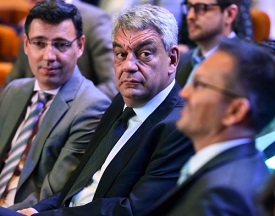 The Ministry of Finance has published the draft „Split VAT” Ordinance. Compared to the data presented at the meetings with the business community or the informal meetings with the media, some changes have occurred. Important changes.
The Ministry of Finance has published the draft „Split VAT” Ordinance. Compared to the data presented at the meetings with the business community or the informal meetings with the media, some changes have occurred. Important changes.
For businesses, perhaps the most important provision in the draft is that a special VAT account can be subject to an enforcement action not only for the payment of the VAT due to the state budget but also for the payment of other outstanding budgetary obligations existing in the records of the central tax authorities.
The „Split VAT” draft ordinance could be approved at the next government meeting despite the fact that the business community unanimously opposed it.
Split VAT, version 2.0
According to Art. 16 of the draft, the VAT account can be foreclosed only for the payment of VAT due to the state budget as well as for the payment of other outstanding budgetary obligations existing in the records of the central tax authorities.
The VAT account may also be foreclosed based on enforceable titles, in accordance with the law, for the VAT on purchases of goods and/or services.
In addition, the draft mentions that if the taxable person ceases to exist, the amounts existing in the VAT account (s) shall be paid to the state budget.
Sanctions regime. And no obligation or responsibility for ANAF
Compared to the initial version, some fines have been structured on different levels for non-payment in the VAT account, failing to pay VAT, failing to notify the partners on the VAT account or failing to pay VAT rates by those who receive cash or card payments.
As a mirror measure, the project establishes the obligation of ANAF to solve in maximum 3 days the taxpayers’ requests to use the amounts available in their VAT account.
This provision comes with no sanction for the employees of the tax authority who do not comply with it.
In recent history, ANAF has repeatedly delayed the VAT reimbursements and former State Secretary from the Ministry of Finance Gabriel Biris stated that Romania was even „on the brink of launching the infringement procedure” for this reason.
It is also noteworthy that the draft also introduces the obligation for the banks to ensure, as of with January 1, 2018, an automatic/manual mechanism to debit and credit the VAT account that would check whether the transactions with the bank instruments are made only between these special accounts.
We shall have VAT split, but not mandatory cash registers
The draft also contains some (conditional) facilities for legal entities that voluntarily join this system before January 1, 2018.
The Ministry of Finance states that differentiated VAT payments will have a positive impact on the business environment and will help improve the collection of this tax and reduce tax evasion.
One measure that would have certainly helped achieve these goals is that of connecting all cash registers to the ANAF servers, a project about which the public learned from former ANAF’s management that the tax authority does not have the capacity to implement it yet.









